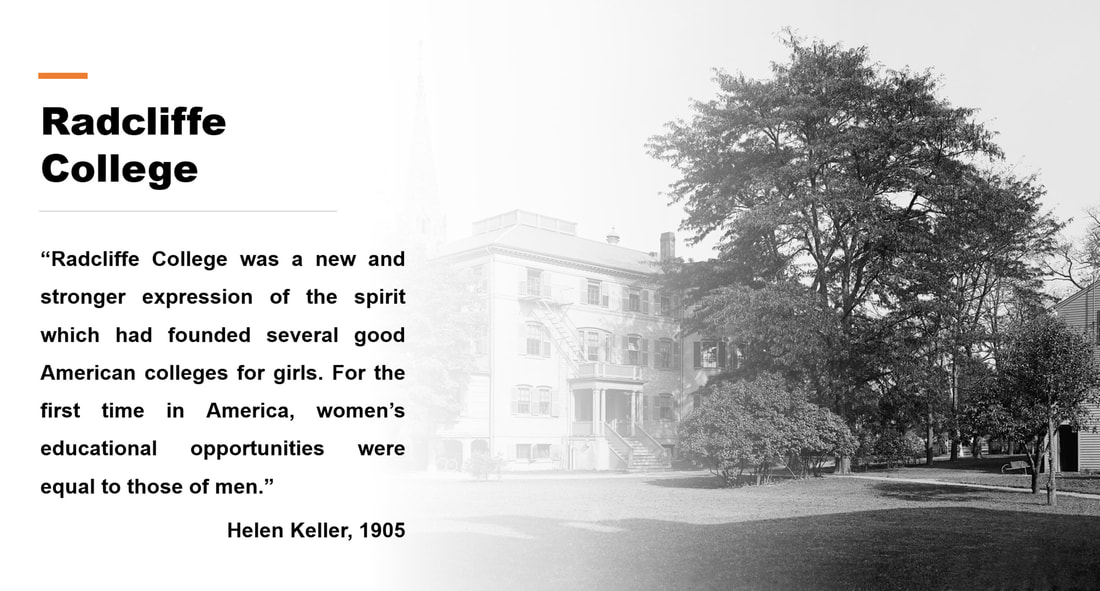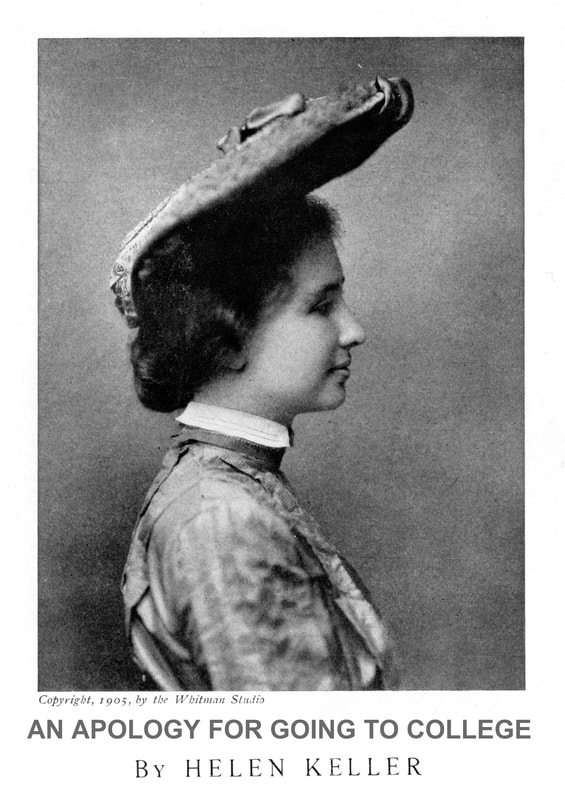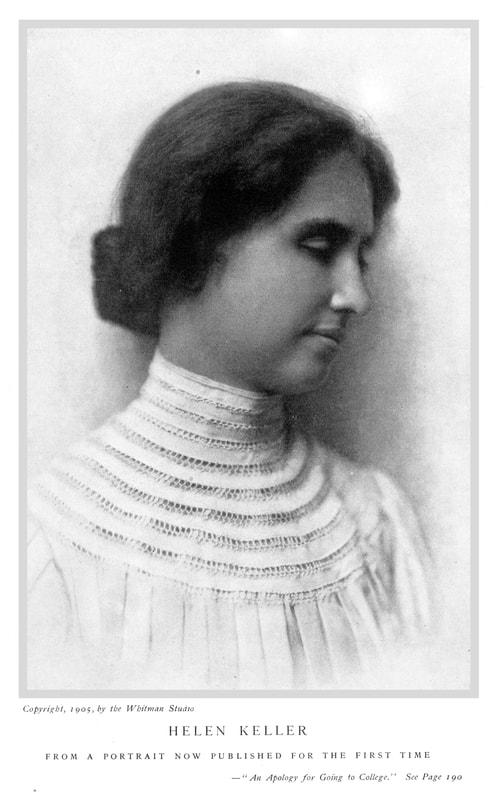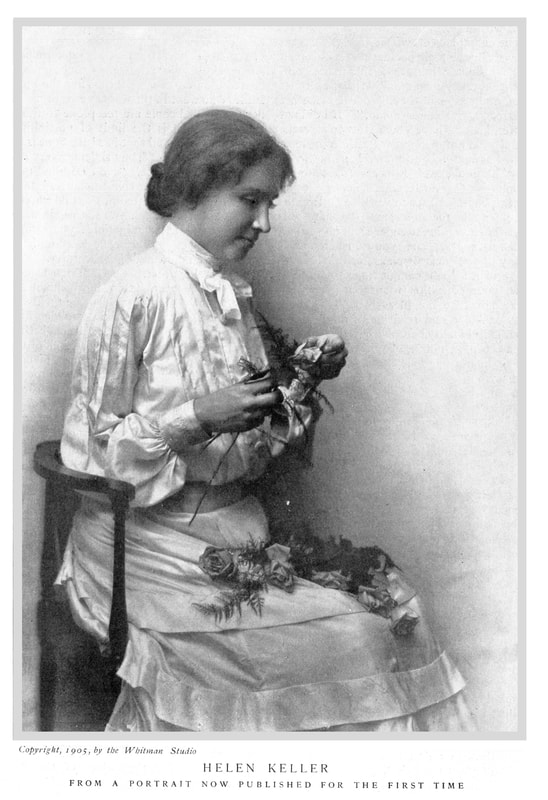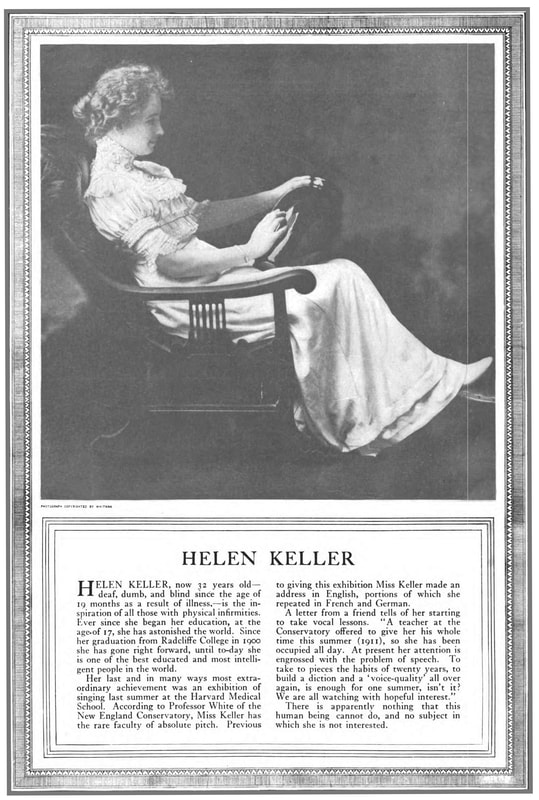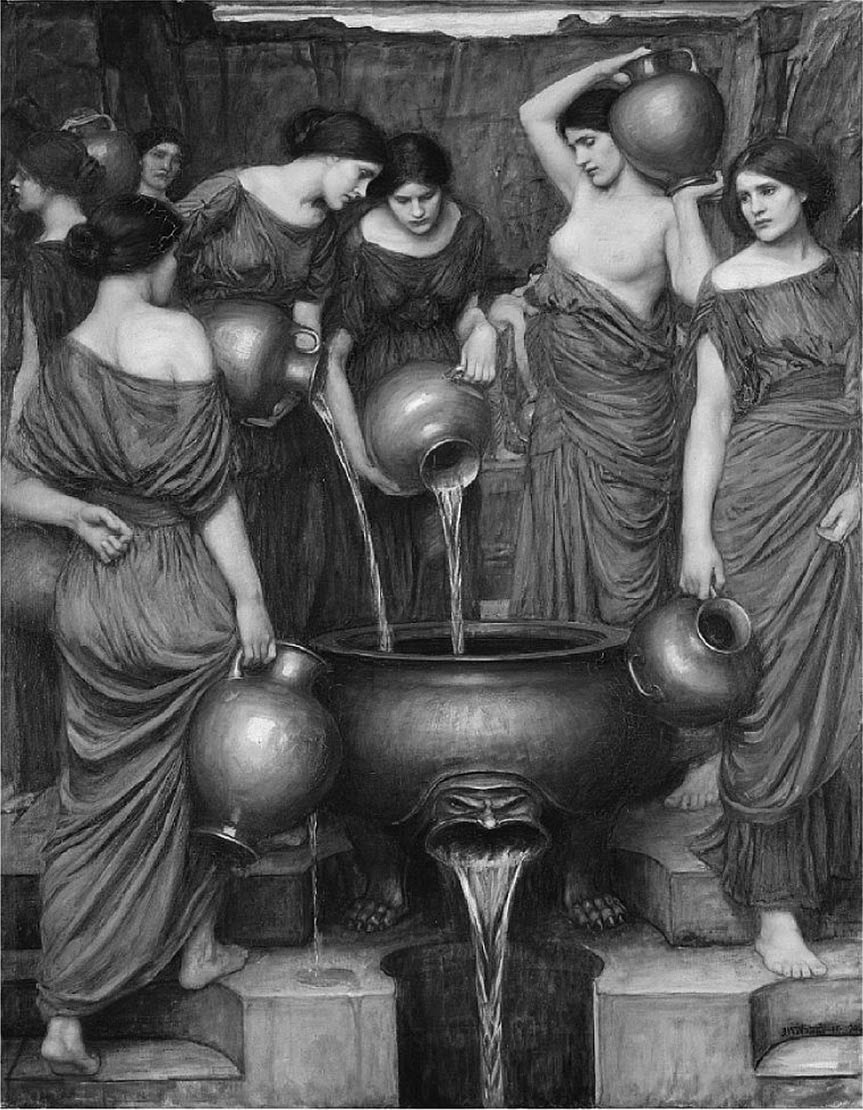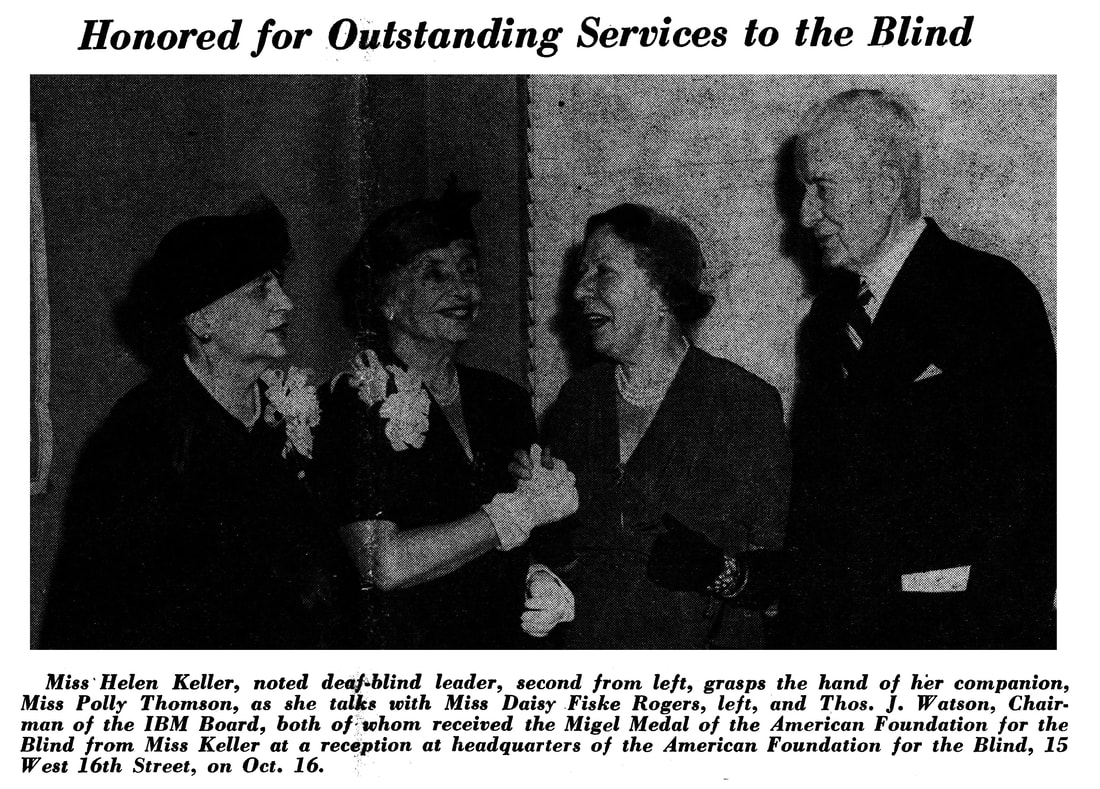Helen Keller: An Apology for Going to College
|
|
Date Published: January 29, 2022
Date Modified: October 19, 2023 |
This article is the result of Peter E. Greulich's on-going study of Tom Watson, traditional founder of IBM. Both Watson and Helen Keller believed in higher education. To jump to the final section of this article written by Peter E. Greulich which focuses on Helen Keller, Tom Watson, and one of Mr. Watson's contributions to assist the blind, choose this link: [Tom Watson and Helen Keller].
Helen Keller's article has been edited for clarity and subheadings were added by this author.
These changes are solely his responsibility.
Helen Keller's article has been edited for clarity and subheadings were added by this author.
These changes are solely his responsibility.
Helen Keller: "An Apology for Going to College"
- Helen Keller’s Personal Decision and Obstacles in Attending College
- The Educational Precedent Women Built—and Enlightened Men Assisted
- The Value of the College Experience
- Individual Choice and Action Determines College “Success”
- This Author's Thoughts and Perceptions
- Extending the Story: Thomas J. Watson Sr. and Helen Keller
- The Banks Pocket-Braille Writer
An Apology for Going to College
by Helen Keller, McClure’s Magazine, October 1905
|
It is heresy in our time to intimate [insinuate] that a young woman may do better than go to college. Five years ago, I had to decide whether I should be a heretic or adhere to the ancient faith that it is the woman’s part to lay her hands to the spindle and to hold the distaff. [See Footnote #1]
Some of my friends were enthusiastic about the advantages of a college education, and the special honor it would be for me to compete with my fellows who see and hear. Others were doubtful. One gentleman said to me: “I do not approve of college women, because they lose all respect for men.” This argument had, however, the opposite effect to what was intended; for I thought if our respect for men could be philosophized, or economized, or debated, or booked away, or by any learning rendered null and void, the men must be at fault, and it was my duty as a woman to try to reestablish them on their ancient pedestal.
Fortunately, women are born with a missionary spirit. |
The champions of what Bacon calls “she colleges” gave their persuasions a Baconian turn. “College makes a full man, conference a ready man, and writing an exact man, and so, college makes a full, ready and exact woman.” …
Then came yet other people who set to work to destroy the arguments of the advocates.
“What use is there in your going to college? You will find much drudgery, and you must renounce many of your dearest pleasures. What will come of it? You cannot hope to teach or turn your education to practical account. Why not take life pleasantly? Why not stay at home and read books and develop your individuality?
“College is only for mediocre people, not for geniuses”—this last was music in my fingers!
Then came yet other people who set to work to destroy the arguments of the advocates.
“What use is there in your going to college? You will find much drudgery, and you must renounce many of your dearest pleasures. What will come of it? You cannot hope to teach or turn your education to practical account. Why not take life pleasantly? Why not stay at home and read books and develop your individuality?
“College is only for mediocre people, not for geniuses”—this last was music in my fingers!
It grieves me that those who spoke so eloquently should have spoken in vain, but the love of knowledge had stopped the ears with which I hear. I felt that all the forces of my nature were cudgeling me to college. It was not in the hope of large scholarship that I made the pilgrimage … The riches I sought consisted in learning to do something … and do it well.
I felt, and still feel, that the demand of the world is not so much for scholarship as for effective service.
The world needs men and women who are able to work, and who will work with enthusiasm; and it is to college graduates that this nation has a right to look for intelligent sons and daughters who will return to the state tenfold what the state has given to them.
I felt, and still feel, that the demand of the world is not so much for scholarship as for effective service.
The world needs men and women who are able to work, and who will work with enthusiasm; and it is to college graduates that this nation has a right to look for intelligent sons and daughters who will return to the state tenfold what the state has given to them.
Helen Keller’s Personal Decision and Obstacles in Attending College
I realized that the avenues of usefulness opened to me were few and strait. But who shall set bounds to the aspirations of the mind, or limit that which the Lord hath created in His mercy and goodness?
|
I had a mind and two good hands by which I had groped my way to the frontiers of knowledge. Beyond the frontiers there might be stretches of desert; but if you must pass through a desert to reach the smiling land of plenty, set forth bravely, and the hard journey across the waste places shall give strength to your feet.
We derive benefit from the things we do not like and do nevertheless because they have to be done … and done—all the more conscientiously—because we do not like them. Necessity teaches patience and obedience. These considerations then, determined me to take a college course.
|
- The Unadventurous Individuals Had Their Opinions
I suppose I appeared to many of my advisers like the Philistines who went to the wars as men proud of destruction.
People are too prone to think that the actual is the limit of possibility. They believe that all that has been done is all that can be done. They ridicule every departure from practice:
People are too prone to think that the actual is the limit of possibility. They believe that all that has been done is all that can be done. They ridicule every departure from practice:
“No deaf-blind person has ever taken a college course. Why do you attempt what no one else has ventured? Even if you succeed in passing the entrance examinations, you cannot go on after you get into college. You have no books. You cannot hear lectures. You cannot make notes. [See topic in this article: The Banks Pocket Braille Writer. It was more than three decades before this last obstacle was overcome with help from Tom Watson, traditional founder of IBM.]
“You are most foolhardy to attempt something in which you are sure to fail.”
Thus counseled the unadventurous people, to whom the untrodden field is full of traps and pitfalls. Although they are Christians, yet they are possessed of the idea that man does everything and God does nothing! The argument that was brought against me, no deaf-blind person had ever gone to college, was precisely the kind of argument brought a generation ago against any woman’s going to college. True, there had been seminaries and academies for girls, but no colleges of an university standard; and the so-called universities for men showed stern oaken doors to all women.
There was no precedent for trying woman’s intelligence in a fair contest by the high criterion men had established for themselves; but women created a new precedent.
There was no precedent for trying woman’s intelligence in a fair contest by the high criterion men had established for themselves; but women created a new precedent.
The Educational Precedent Women Built—and Enlightened Men Assisted
Before 1878, women, backed by public opinion, were already standing at the door of Harvard demanding higher education, and conservative men felt uneasy lest they should seem selfishly to monopolize knowledge. A few progressive members of the Harvard Faculty agreed to teach women in private classes. There was a precedent for this; for in England women were already receiving instruction from professors of Oxford and Cambridge. The new project in American Cambridge enlisted, between 1879 and 1881, the services of nearly forty Harvard professors. According to a historian, the few women who availed themselves of this new opportunity were keen, earnest and capable to such a degree that the only trouble was to satisfy their demands.
In 1882, the Society for the Collegiate Instruction of Women was organized. The next year three young women finished the four-year course, and about fifty were taking partial courses. All had proved their ability to do work at least equal to that of Harvard [male] students. Yet there were no degrees to reward them, only certificates stating that the course they had taken was equal to one at Harvard. …
In 1894, the Society took the name of Radcliffe College, and got its charter from the legislature, which gave it the right to confer its own degree. This degree is countersigned by the president of Harvard, who warrants it equal to a Harvard degree. We owe Radcliffe not to Harvard, but to the success of those first earnest students who proved that they were able to do university work, and to the large-minded professors who, by unofficial and individual devotion to learning, helped the Pilgrim band to found a safe, permanent home where other women could come.
That little band has transmitted the torch of learning for women from frontier to frontier, until there is not a state in the Union which does not provide for the higher education of women. Every woman, whether she can go to college or not, owes a great deal to those pioneers who cleared a place in the wilderness of men’s prejudice for the lowly walls of the first woman’s college.
In 1882, the Society for the Collegiate Instruction of Women was organized. The next year three young women finished the four-year course, and about fifty were taking partial courses. All had proved their ability to do work at least equal to that of Harvard [male] students. Yet there were no degrees to reward them, only certificates stating that the course they had taken was equal to one at Harvard. …
In 1894, the Society took the name of Radcliffe College, and got its charter from the legislature, which gave it the right to confer its own degree. This degree is countersigned by the president of Harvard, who warrants it equal to a Harvard degree. We owe Radcliffe not to Harvard, but to the success of those first earnest students who proved that they were able to do university work, and to the large-minded professors who, by unofficial and individual devotion to learning, helped the Pilgrim band to found a safe, permanent home where other women could come.
That little band has transmitted the torch of learning for women from frontier to frontier, until there is not a state in the Union which does not provide for the higher education of women. Every woman, whether she can go to college or not, owes a great deal to those pioneers who cleared a place in the wilderness of men’s prejudice for the lowly walls of the first woman’s college.
- Radcliffe College Exemplified a New and Strong Expression of Educational Spirit
Radcliffe College was a new and stronger expression of the spirit which had founded several good American colleges for girls. For the first time in America women’s educational opportunities were equal to those of men. Radcliffe College inherits the spirit of the women who, twenty-seven years ago, sought knowledge for its own sake. Radcliffe is still for earnest women who seek knowledge for its own sake. Girls who go there should have some object in view, some standard of excellence, the gift of handling knowledge in a plain, downright way. There is too little teaching at Harvard or Radcliffe, but there is much opportunity to learn. You may take the treasures offered or leave them.
At Radcliffe, I think, the treasures are more highly valued than among the young gentlemen across the street [at Harvard]; for young men, I am told, go to college for a variety of reasons, or for no reason at all. But a girl who goes to Radcliffe should be filled with the desire to look behind the forms of things into things themselves, and to add to beauty and softness, solidity and accuracy of knowledge.
Stucco is no more serviceable to woman than to man. A well-trained mind and the ability to grasp the ideas essential to a purpose and carry them out with perseverance—this is the ideal Radcliffe places before women. How far this ideal can be realized appeared at a meeting of Radcliffe alumni last year, where there were nine speakers: scholar, poet, teacher, dramatist, administrative woman, and the woman in domestic life. Their success had lain in different directions, and each testified that she owed her success in large part to her training at Radcliffe.
Any young woman who acquires the self-control which Radcliffe teaches, and performs her task resolutely, may stand up before the kings of learning and not be ashamed, whether she be a writer, a teacher, a speaker, an administrative woman, a society woman, or a home-maker.
Radcliffe strives to give her students the substance of wisdom, and to promote earnest and independent scholarship. In her, discipline, knowledge and self-mastery have replaced the narrow rules of conduct and the prudish dogmatism of the old-fashioned women’s academies, just as arbitration and statesmanship are replacing the soldier and the priest. …
For the first time in the history of the world, [See Footnote #2] women are expected to have an intelligent understanding of business, of politics, of all the practical problems of our modern life.
The college woman learns to cooperate with others, and that means she learns how not to have her own way.
At Radcliffe, I think, the treasures are more highly valued than among the young gentlemen across the street [at Harvard]; for young men, I am told, go to college for a variety of reasons, or for no reason at all. But a girl who goes to Radcliffe should be filled with the desire to look behind the forms of things into things themselves, and to add to beauty and softness, solidity and accuracy of knowledge.
Stucco is no more serviceable to woman than to man. A well-trained mind and the ability to grasp the ideas essential to a purpose and carry them out with perseverance—this is the ideal Radcliffe places before women. How far this ideal can be realized appeared at a meeting of Radcliffe alumni last year, where there were nine speakers: scholar, poet, teacher, dramatist, administrative woman, and the woman in domestic life. Their success had lain in different directions, and each testified that she owed her success in large part to her training at Radcliffe.
Any young woman who acquires the self-control which Radcliffe teaches, and performs her task resolutely, may stand up before the kings of learning and not be ashamed, whether she be a writer, a teacher, a speaker, an administrative woman, a society woman, or a home-maker.
Radcliffe strives to give her students the substance of wisdom, and to promote earnest and independent scholarship. In her, discipline, knowledge and self-mastery have replaced the narrow rules of conduct and the prudish dogmatism of the old-fashioned women’s academies, just as arbitration and statesmanship are replacing the soldier and the priest. …
For the first time in the history of the world, [See Footnote #2] women are expected to have an intelligent understanding of business, of politics, of all the practical problems of our modern life.
The college woman learns to cooperate with others, and that means she learns how not to have her own way.
The Value of the College Experience
|
Experience in college activities teaches her the right of her companions to freedom of thought and action. By throwing herself into college affairs, she acquires the habit of rendering intelligent and efficient service to others; so that when she graduates, she becomes a practical force in the world, and a responsible member of society.
Like all human institutions Radcliffe falls short of her ideals, and her students, who are also human, do not always achieve theirs. … Where I failed, the fault was sometimes my own, sometimes attributable to the peculiar circumstances under which I worked. But my successes were made possible by the spirit and the methods of the college and its unique advantages. And there were many advantages I could not avail myself of. The lectures, libraries, theaters, and museums for which Boston and Cambridge are celebrated and which largely supplement college work, were not of service to me. |
The advantages of especial value to me were the excellence of the instruction and the liberality of the elective system. The quality of the instruction at Radcliffe is beyond question; for it is given by the best men at Harvard. The elective system offers a broad variety of courses and freedom of choice. Many subjects were impossible for me on account of my limitations [blind and deaf], and I could not have planned my course so as to win a degree but for the scope of the Radcliffe curriculum. The ordinary student, who is not so restricted as I was, has wider opportunities, and she must choose wisely.
In her very selection of courses there is a chance to “develop her individuality;” and in the exercise of judgment as to the amount of time and energy she will devote to her work, she proves her individuality.
In her very selection of courses there is a chance to “develop her individuality;” and in the exercise of judgment as to the amount of time and energy she will devote to her work, she proves her individuality.
Individual Choice and Action Determines College “Success”
In a college like Radcliffe, where so much depends on individual judgment, the students fall naturally into three classes: first, those who choose their course wisely and pursue it with consistency, without sacrificing other joys and interests; second, “joyless grinds” who study for high marks; and third, those who choose indiscriminately courses that are pleasant, easy, and unrelated.
- The First Class: Those Who Choose Wisely and Employ Consistency
|
In the first class are those who realize that to get the greatest benefit from college it is necessary to take one’s time, to proceed at an easy gait, and not to hurry or scramble. They know the pleasure of lingering over a subject, of asking questions, and of following an idea as fancy listeth.
Happy study is as sweet to the true student as news of his sweetheart to the ardent lover. But the happy following of an interesting idea is not always possible. The arbitrary demands of instructors and the exigencies of a mechanical routine often forbid it. If my college is at fault in not permitting enough leisurely and meditative study, I hereby suggest my panacea—fewer courses, and more time for each. … To be candid, I have proposed the leisurely, reflective manner of study because I have an indolent, wayward mind which likes to ramble through the garden of knowledge, picking here a leaf, there a blossom, and so off to pastures new.
|
Fortunately, the spirit of Radcliffe and a good conscience forbid that the student shall abuse her liberties.
It is good for us to read books we do not like. The performance of set tasks and work that is not of our choosing are stimulating. Miry ways and rugged mountain paths mean strength, grip and poise. If they draw out our miles and make them wearisome, it only means that we have new vigor added to us, and that we shall enter into the treasures of endurance. I know not whether I, with more delight, strapped the knapsack over my shoulder or set it down at the end of the journey.
The mastering of difficulties is followed by a sense of well-being and capacity which is like a river of water in a dry land, like the shadow of a great rock in the heat.
The girl who is not a slave to books, who selects her courses judiciously and gives them a right and proper amount of strength, is not to be confounded [confused] with the girl whose independence is mere indifference or egotism. Not such do I admire, and, for all my pet schemes to reform my college, not such am I. I only maintain that we have a right to ourselves, that we should be masters of our books and preserve our serenity. There is no profit where there is no pleasure. College consists of five parts sense and five parts what—from the class-room point of view—would be called nonsense; but nonsense is the very vitality of youth.
After all, book-knowledge is not the most important thing to acquire, and perpetual work on five or six courses cannot be sustained without neglect of other important things. Even thoughtful and independent girls try to do so much that they can do nothing thoroughly. They rush, cram, thieve many hours from their nights, and for all their ill-timed industry they hand in next morning papers full of mistakes.
It is good for us to read books we do not like. The performance of set tasks and work that is not of our choosing are stimulating. Miry ways and rugged mountain paths mean strength, grip and poise. If they draw out our miles and make them wearisome, it only means that we have new vigor added to us, and that we shall enter into the treasures of endurance. I know not whether I, with more delight, strapped the knapsack over my shoulder or set it down at the end of the journey.
The mastering of difficulties is followed by a sense of well-being and capacity which is like a river of water in a dry land, like the shadow of a great rock in the heat.
The girl who is not a slave to books, who selects her courses judiciously and gives them a right and proper amount of strength, is not to be confounded [confused] with the girl whose independence is mere indifference or egotism. Not such do I admire, and, for all my pet schemes to reform my college, not such am I. I only maintain that we have a right to ourselves, that we should be masters of our books and preserve our serenity. There is no profit where there is no pleasure. College consists of five parts sense and five parts what—from the class-room point of view—would be called nonsense; but nonsense is the very vitality of youth.
After all, book-knowledge is not the most important thing to acquire, and perpetual work on five or six courses cannot be sustained without neglect of other important things. Even thoughtful and independent girls try to do so much that they can do nothing thoroughly. They rush, cram, thieve many hours from their nights, and for all their ill-timed industry they hand in next morning papers full of mistakes.
|
Although I always tried to work with a cool head and steady hand, and sleep according to the law, I too was drawn into this whirlpool of confused. incomplete tasks. I met other girls in the college halls and on the stairs who stopped a moment to greet me, but they were rushing from lecture to examination, from examination to basketball practice, from practice to dramatic rehearsal, from rehearsal to conference, and there was no time for a pleasant chat.
And if the girls who had eyes and ears were overburdened and distraught, I was at least no better off. For four years, a torrent of miscellaneous knowledge poured through my fingers, and it fills me with despair to think how much of the choicest matter of this abundant stream dripped and oozed away. I was eager to draw from the living waters of wisdom; but my pitcher must have had a hole in it. I was like the Danaïdes who poured water eternally into a broken urn. |
Pouring water eternally into a broken urn
|
Once in a while a book or an instructor started a vein of bright thoughts. I caught a glimpse of old truths in a new perspective: but I could not linger. Before I had got a good look, I was hurried away on the current of words, and in the effort to keep from being upset in midstream I lost sight of the bright idea, and on reaching firm ground I was chagrined to find that it had fallen overboard. The idea irrevocably lost was often one on which depended a fortnightly composition, or even a three hours’ examination.
- The Value of the College Struggle
I was of course hampered by my limitations [blind and deaf], which turned to drudgery much work that might have been delightful; for they imposed upon me tedious methods of study. I was often behind in my work at a distance forbidden by military law; I was never ahead; and once I fell so far behind that it seemed as if I might as well try to keep pace with a shooting star!
|
Experience, however, taught me to tack against wind and tide—the first lesson of life I learned in college. … I would not part with one of those struggles against the gales—“the winds and persecutions of the sky.” They tested my powers and developed the individuality which I had been advised to bring up on books at home.
Had I not gone to college, I should have missed some of the authors whose individuality taught me to value my own without isolating myself from the seeing and hearing world. I discovered that darkness and silence might be rich in possibilities, which in my turn I might discover to the world. |
In other words, I found the treasures of my own island. Yet, different students seek different treasures.
To some the most precious nuggets are high marks. … We hear about them with the wonder with which we listened to the fairy tales of our childhood; but we should not dream of following them any more than we should think of going in search of the singing-tree in the “Arabian Nights.” Their high marks are no incentive to us to fill our midnight lamps with oil that we may enter in with the wise virgins. They stuff themselves with dates, and with figs gathered of thistles, and think themselves blessed. They have dyspeptic nightmares of the brain, in which they go through flood and fire, seeking the phantom gold at the rainbow’s end. The court to which they return from a futile quest or with meager spoil, is a chamber of inquisition.
Oh, the examinations! They separate us from our kind. They water our pillows, they drive sleep from our beds, they inspire us with hope, then dash us ruthlessly from our pinnacle, they cross-question us until their martyrs lie in the dust, and their apostasy is the open secret of the universe. Oh, those little crisp sheets of paper written with a pencil of fire which consume ideas like chaff! They are the accidents of time and flesh, they are mere conundrums on which we throw away our beauty sleep; and, in the end, all the dull substance of our brains and our ingenious padding dwindle to “a lame and impotent conclusion.”
Before an examination we feel delightfully precocious and original. After it we are full of the wise things we did not say. We took twice as much trouble as was necessary to prepare our subject only to miss the essential points after all. The least explicable thing that an examination paper does is to destroy your sense of proportion and reduce everything you have read to a dead level. …
You make your little fishes talk like whales, and your whales twitter like canary birds. …
To some the most precious nuggets are high marks. … We hear about them with the wonder with which we listened to the fairy tales of our childhood; but we should not dream of following them any more than we should think of going in search of the singing-tree in the “Arabian Nights.” Their high marks are no incentive to us to fill our midnight lamps with oil that we may enter in with the wise virgins. They stuff themselves with dates, and with figs gathered of thistles, and think themselves blessed. They have dyspeptic nightmares of the brain, in which they go through flood and fire, seeking the phantom gold at the rainbow’s end. The court to which they return from a futile quest or with meager spoil, is a chamber of inquisition.
Oh, the examinations! They separate us from our kind. They water our pillows, they drive sleep from our beds, they inspire us with hope, then dash us ruthlessly from our pinnacle, they cross-question us until their martyrs lie in the dust, and their apostasy is the open secret of the universe. Oh, those little crisp sheets of paper written with a pencil of fire which consume ideas like chaff! They are the accidents of time and flesh, they are mere conundrums on which we throw away our beauty sleep; and, in the end, all the dull substance of our brains and our ingenious padding dwindle to “a lame and impotent conclusion.”
Before an examination we feel delightfully precocious and original. After it we are full of the wise things we did not say. We took twice as much trouble as was necessary to prepare our subject only to miss the essential points after all. The least explicable thing that an examination paper does is to destroy your sense of proportion and reduce everything you have read to a dead level. …
You make your little fishes talk like whales, and your whales twitter like canary birds. …
- The Second Class: Those Who Make College a Joyless Grind
The chief loss of a girl who “grinds” is that she misses other college activities. It is the light of college education to join with one’s fellow-students on class-teams, in college plays, and on the college magazines. For the most part you study by yourself; but in the united activities of class and college you learn the tact and community which are the beginning of useful service to mankind. Of course, I had little part in the social life of my college. I enjoyed my share of work; the obstacles which were declared insurmountable came against me one way and retreated seven ways, and that was happiness enough.
I had, too, many pleasures, solitary and apart from the other girls, but as genuine as theirs. They often invited me to join their frolics and club-meetings, and it cost me many a twinge of regret not to be able to take part in their affairs; for I was keenly alive to everything that interested them. …
Nothing encourages us so much as the example of others, nothing stirs our energies more than generous emulation, nothing comforts us so much in discouragement as companionship. My friendships must come through the medium of my hand, and few of the girls knew the manual [braille] alphabet; and the conditions under which we shook hands for a moment in the crowded classroom were not favorable to intimacy. They could not reach me through my isolation, and in the midst of my class I could not help at times feeling lonely and sad.
But a happy disposition turns everything to good; yea, the want of one thing lacking, when so many melancholy beings want everything. I forgot my loneliness in cheerful realities that touched me. I knew there was a rich store of experience outside my comprehension, but the little I could grasp was wonderful enough, and having contentment, I was possessed of the boon whereof I had been beggared.
A happy spirit is worth a library of learning.
I think I derived from the daily walk to college with Miss Sullivan, more genuine pleasure than comes to many a girl who sits in a corner and works the sunshine, the fresh air, and even good humor out of her morning lessons—all for high marks.
I had, too, many pleasures, solitary and apart from the other girls, but as genuine as theirs. They often invited me to join their frolics and club-meetings, and it cost me many a twinge of regret not to be able to take part in their affairs; for I was keenly alive to everything that interested them. …
Nothing encourages us so much as the example of others, nothing stirs our energies more than generous emulation, nothing comforts us so much in discouragement as companionship. My friendships must come through the medium of my hand, and few of the girls knew the manual [braille] alphabet; and the conditions under which we shook hands for a moment in the crowded classroom were not favorable to intimacy. They could not reach me through my isolation, and in the midst of my class I could not help at times feeling lonely and sad.
But a happy disposition turns everything to good; yea, the want of one thing lacking, when so many melancholy beings want everything. I forgot my loneliness in cheerful realities that touched me. I knew there was a rich store of experience outside my comprehension, but the little I could grasp was wonderful enough, and having contentment, I was possessed of the boon whereof I had been beggared.
A happy spirit is worth a library of learning.
I think I derived from the daily walk to college with Miss Sullivan, more genuine pleasure than comes to many a girl who sits in a corner and works the sunshine, the fresh air, and even good humor out of her morning lessons—all for high marks.
- The Third Class: Those Who Choose the Easy Path
On the other hand, I do not understand the motives of that third class of girls who go to college, apparently, to be entertained. I do not see the use of studies chosen from year to year, without plan or forethought, because this instructor marks easily, or that professor is “so nice,” or the conference man is “so polite,” or “Dr. G. keeps you so interested”—in himself, that means, not in the subject. These girls dip into all that treat of whatsoever is, the state, the total chronicle of man, chemical and electrical laws, and whatsoever can be taught and known. “General education” is their apology, their rock of defense, their tabernacle from which they shall not be moved.
I have known girls who graduated, and with good marks too, whose minds seemed to me undisciplined and crammed with odds and ends of knowledge which they displayed for the enlightenment of their friends. They reminded me of the maidens of old whose accomplishments were feminine and elegant, who brought out a sketch book to be inspected by admiring friends.
The sketches represented nothing that creeps on the ground, flies in the air or passes through the paths of the seas, but they were ladylike all the same.
Girls whose education is too general shall prove to have none at all. Their infinite variety will be withered by age and staled by custom.
I have known girls who graduated, and with good marks too, whose minds seemed to me undisciplined and crammed with odds and ends of knowledge which they displayed for the enlightenment of their friends. They reminded me of the maidens of old whose accomplishments were feminine and elegant, who brought out a sketch book to be inspected by admiring friends.
The sketches represented nothing that creeps on the ground, flies in the air or passes through the paths of the seas, but they were ladylike all the same.
Girls whose education is too general shall prove to have none at all. Their infinite variety will be withered by age and staled by custom.
The ideal of college education is not to give miscellaneous instruction, but to disclose to the student his highest capacities and teach him how to turn them to achievement. By this ideal, those who labor in darkness are brought to see a great light, and those who dwell in silence shall give service in obedience to the voice of love.
by Helen Keller, McClure's Magazine, October 1905
This Author's Thoughts and Perceptions
There is value in a college education but each individual has to evaluate the expense and multi-year commitment for themselves. I started my higher-education journey in 1968, and I did not attain my four-year degree until 1978: a decade later.
Along the way: I was recognized as the outstanding freshman mathematics major at the local community college; To pay for my on-again, off-again, college education, I earned the GI Bill by serving three years in Germany standing against the Iron Curtain; After my honorable discharge, I worked on a sanitation crew at my local hometown meat-packers plant; I married and we had two children; And my final job before graduation was as a lead "Whopper Flopper" at Burger King.
It was a long, tedious journey to graduate with honors from the University of Texas at Austin. The reviewer who revealed this honor to me—after reviewing my transcript—said, "You probably have one of the lowest grade-point averages ever to be recognized in this way. The rules are changing and you wouldn't have qualified next year." Isn't it amazing how some individuals don't understand the tasks and hazards of achieving a goal after a decade of effort? (Someday, I will write this story. As Helen Keller described above, some individuals are possessed of the idea that "man does everything and God does nothing!" All I saw was His miracle and His timing in the reviewer's acknowledgement!)
Many chief executive officers will tell you that a college education is unnecessary to work in their organizations. This may be true and surely there are other life-tests that can bring an individual the life-skills necessary to work cooperatively, passionately and enthusiastically with others. I learned these skills in scrapping, scrimping, and saving to reach my educational goal: a four-year degree.
Yet, nothing I went through could ever compare to what Helen Keller struggled with in the first decade of the 20th Century. The truly only thing comparable is that as I read this article, I understood her. My journey was definitely so much easier than hers, and yet I truly believe that what she wrote is so true:
Along the way: I was recognized as the outstanding freshman mathematics major at the local community college; To pay for my on-again, off-again, college education, I earned the GI Bill by serving three years in Germany standing against the Iron Curtain; After my honorable discharge, I worked on a sanitation crew at my local hometown meat-packers plant; I married and we had two children; And my final job before graduation was as a lead "Whopper Flopper" at Burger King.
It was a long, tedious journey to graduate with honors from the University of Texas at Austin. The reviewer who revealed this honor to me—after reviewing my transcript—said, "You probably have one of the lowest grade-point averages ever to be recognized in this way. The rules are changing and you wouldn't have qualified next year." Isn't it amazing how some individuals don't understand the tasks and hazards of achieving a goal after a decade of effort? (Someday, I will write this story. As Helen Keller described above, some individuals are possessed of the idea that "man does everything and God does nothing!" All I saw was His miracle and His timing in the reviewer's acknowledgement!)
Many chief executive officers will tell you that a college education is unnecessary to work in their organizations. This may be true and surely there are other life-tests that can bring an individual the life-skills necessary to work cooperatively, passionately and enthusiastically with others. I learned these skills in scrapping, scrimping, and saving to reach my educational goal: a four-year degree.
Yet, nothing I went through could ever compare to what Helen Keller struggled with in the first decade of the 20th Century. The truly only thing comparable is that as I read this article, I understood her. My journey was definitely so much easier than hers, and yet I truly believe that what she wrote is so true:
"If you must pass through a desert to reach the smiling land of plenty, set forth bravely, and the hard journey across the waste places shall give strength to your feet. We derive benefit from the things we do not like and do nevertheless because they have to be done … and done—all the more conscientiously—because we do not like them. Necessity teaches patience and obedience."
This is an amazing article. Timeless in its wisdom. It should be considered as a mandatory read for all those executives who believe a college education unnecessary. I truly doubt that any of their struggles can compare with Helen Keller's. Every individual to achieve peace in life must learn the value and power of "delayed gratification."
May Helen Keller rest in peace and be thanked for these insights.
May you also learn patience and obedience.
May you also learn patience and obedience.
[The following is written by Peter E. Greulich and is based on his research into the life of Thomas J. Watson Sr.]
- Extending the Story: Thomas J. Watson Sr. and Helen Keller
|
Helen Keller presented the Migel Medal specifically for Tom Watson’s efforts in providing employment for the blind and his belief that the employment of the handicapped was not just the humane thing, but that they were as efficient as any other employee if properly trained and placed appropriately.
She said in part: To you, Mr. Watson, I proudly present the Migel Medal as a token of the deep honor with which we workers for the blind bless your name. |
It has thrilled me to read how you, one of the foremost industrialist leaders in America, recognize the right of the handicapped to employment that places them in a status of independence and service to the community. It gratifies me, especially, to see the blind included among them. Heartily I agree with you that the training of capable blind persons for self-support is not a charity, but a practical enterprise which affords positive satisfaction to them [the blind] as well as to seeing employees. … [you] encourage your engineers to devise mechanical and electrical aids for the blind in pursuing their varied occupations. …
Your influence will be a light to other large employers. … to bring about as nearly as possible equality of opportunity between those without sight and those who see.
The Migel Medal was established in 1937 by the late M. C. Migel, first president of the American Foundation for the Blind. It recognized both professionally employed practitioners in educational, rehabilitation and social welfare programs as well as lay persons in business who dedicated themselves to advancing services for the blind. At the time this medal was awarded, the corporation employed “746 handicapped persons—including 25 totally blind, 69 who were blind in one eye, and 61 with other visual disabilities.”
The following is one example of how Tom Watson’s association with other organizations benefited the handicapped and, in this instance, specifically blind individuals.
The following is one example of how Tom Watson’s association with other organizations benefited the handicapped and, in this instance, specifically blind individuals.
- The Banks Pocket-Braille Writer
|
Dr. Alfred E. Banks invented and constructed this device in California in 1940. He produced three models in the 1940–41 timeframe. This copper, brass, and steel braille writer with six keys and a spacer produced a single line of braille on a narrow paper ribbon that enabled a blind individual to write braille at shorthand speeds and thus take dictation, enable quick communications between blind individuals, or capture notes for later reference.
The model pictured here was one of the first of three early prototypes made by the inventor. This braille writer was 7½ x 4½ x 1¼ inches high and capable of being carried in a handbag or vest pocket, therefore the name: Banks’ Pocket Braille Writer. |
Image of the Banks' Pocket-Braille Writer.
|
After learning of the device, the Lions Club of San Diego contacted Thomas J. Watson Sr. to inquire if the chief executive could and would manufacture the devices. IBM produced 1,000 of the writers that were distributed at no charge through the Lions Club to disabled World War II veterans. After that, the corporation produced the braille writers at cost for the club for worldwide distribution—eventually reaching a total of fourteen countries.
Footnote #1: From Daily Art Magazine: “The basic tools used to spin the fibers [to form yarn] were the spindle and the distaff. A distaff is designed to hold the unspun fibers, meanwhile a spindle is a straight spike, usually made from wood, onto which the fiber is being spun [source here].”
Footnote #2: And this author would add that it occurred here in the United States of America.
Footnote #2: And this author would add that it occurred here in the United States of America.
